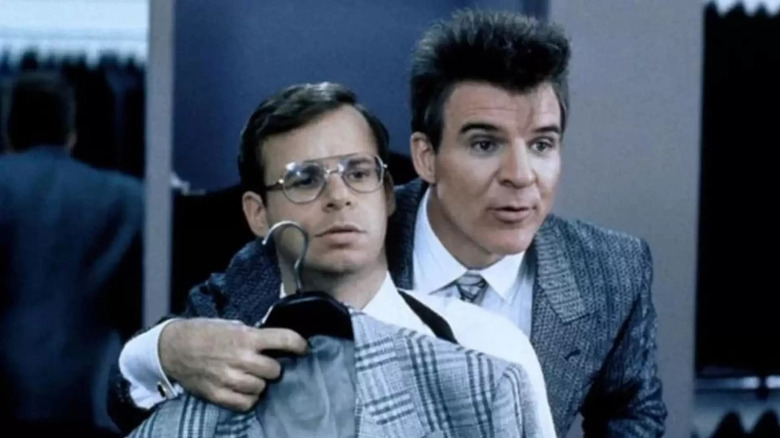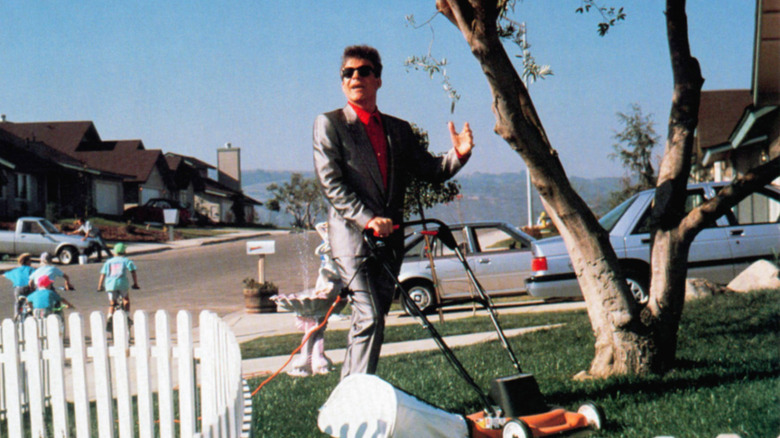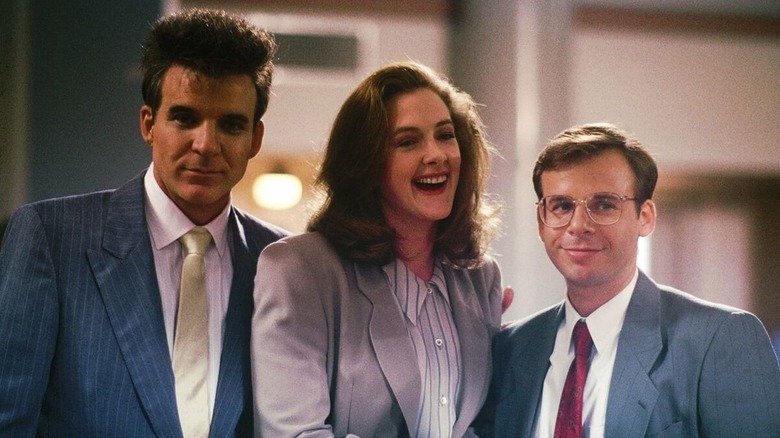Martin Scorsese's Goodfellas Sort Of Got A Sequel Thanks To A Rick Moranis Comedy
The 1990s were notorious for Hollywood studios releasing movies about the same thing around the same time: "Tombstone" and "Wyatt Earp," "Volcano" and "Dante's Peak," and "Armageddon" and "Deep Impact" are among the most high-profile examples. Before all that, the decade kicked off with one of the strangest double-ups based on the memoirs of Henry Hill, the real-life New York gangster who ended up in the Witness Protection Program after testifying against his old Mafia buddies. One movie was Martin Scorsese's "Goodfellas," and the other was a sequel of sorts, though it hit theaters first: Herbert Ross' fish-out-of-water comedy "My Blue Heaven."
Remarkably, both films stemmed from the same source. Hill's story was already high-profile thanks to his part in 50 convictions of the Lucchese crime family but gained even more widespread attention with the publication of Nicholas Pileggi's "Wiseguy: LIfe in a Mafia Family" in 1985. Pileggi's gripping book provided a wealth of street-level insight into the inner workings of the mob from the perspective of a foot soldier who (literally) knew where all the bodies were buried. The tale had an added wrinkle after Hill entered Witness Protection; despite the obvious danger to himself, his wife, and his children, he was unable to fully adjust to a regular life and was later kicked off the program for further criminal behavior.
Pileggi, a New York journalist with a life-long interest in the Mafia, conducted extensive research including numerous interviews with Hill for "Wiseguy." Also present during many of their conversations was Pileggi's wife, Nora Ephron, the filmmaker who penned Rob Reiner's "When Harry Met Sally..." and wrote and directed classics like "Sleepless in Seattle." Ephron even had her own one-on-one phone calls with Hill about the minutiae of life in Witness Protection, and those chats gave her the idea for "My Blue Heaven" starring Steve Martin and Rick Moranis. Despite being first out of the gate in August 1990 — "Goodfellas" premiered in September — the crime comedy has since been vastly overshadowed by "Goodfellas" and stands as a somewhat forgotten entry in Martin's filmography. Let's take a closer look at how it plays out and whether it's worth your time.
What happens in My Blue Heaven?
Vinnie Antonelli (Steve Martin) is a swaggering mobster placed in the federal Witness Protection Program as he prepares to testify against his former associates back in New York. His new home is Fryburg, California, a sedate white-picket-fence town on the outskirts of San Diego, where he is under the watchful eye of straitlaced FBI agent Barney Coopersmith (Rick Moranis). Neither Vinnie nor his wife, Linda (Deborah Rush), are too enthused about the change of location, and she quickly calls it quits and heads back to the big city.
Vinnie slips back into his old criminal ways, which lands in hot water with dowdy District Attorney Hannah Stubbs (Joan Cusack). She wants to bust him for his petty crimes, but luckily Barney isn't about to let a small-time bust jeopardize Vinnie's key role in the upcoming mob trial. The two men bond, and Vinnie finds further companionship when he discovers that Fryburg is home to Billy Sparrow (William Hickey), an old friend from back east, and a whole gang of former wise guys. During dinner, the reformed mobsters tell Vinnie that the government checks only last until after he testifies. Beyond that, he'll have to get a job like all the regular folk. Unhappy with that idea, he proposes teaming up to start a crime wave with Barney on hand to get him out of trouble when he gets arrested again.
If you ever sat there at the end of "Goodfellas" wondering what life as a "schnook" was like for an unrepentant criminal like Henry Hill, then "My Blue Heaven" provides an amusing spin on the scenario. It's a lighthearted comedy that plays out almost exactly as you would expect, working better in the earlier scenes when Vinnie gleefully breaks the law and runs circles around Barney and Hannah. Nora Ephron was one of Hollywood's frothiest writers, and Herbert Ross was one of the most inoffensive directors around, so there is nothing controversial or hard-hitting here, not even accidentally. Vinnie is a sweetheart beneath the tough talk and the silk suits, and the inevitable final showdown with hitmen sent to rub him out is pretty frictionless. In other words, "My Blue Heaven" may be based on the same real-life story, but it is the total opposite of "Goodfellas."
Is My Blue Heaven worth watching?
"My Blue Heaven" is an entertaining diversion that never quite reaches the comic heights that its terrific premise suggests. That's pretty baffling when you consider the talent involved; Steve Martin and Rick Moranis were still at their peak, Nora Ephron just got an Oscar nomination for writing "When Harry Met Sally...," and director Herbert Ross was following up from a substantial box office hit with "Steel Magnolias."
Sadly, the movie is woefully undercooked, and the stars aren't given much to work with. Ephron's screenplay keeps putting Vinnie in amusing situations, but very few scenes reach their full potential. It's almost as if Ross was working from an early draft from before Ephron could develop the story and flesh out the characters further. To make matters worse, the film never gets a chance to flow because the thin material is constantly interrupted by pointless inter-titles that break up the story into largely laugh-free chapters.
Martin and Moranis might have been able to inject some of their own energy into "My Blue Heaven" if they weren't so miscast. Reportedly, Martin was originally drawn to the project to play the uptight FBI agent role. That would have made sense as the movie came along when Martin was gravitating from his wild and crazy days toward slightly more serious roles, and his performance in "Planes, Trains, and Automobiles" proved he could be a great straight man. Instead, he seems ill at ease as Vinnie, giving the crook a little superficial braggadocio and a half-hearted wise guy accent, but also radiating the sense that Martin himself wasn't convinced about playing the role.
Opposite Martin, Moranis plays Barney almost entirely straight, which doesn't make the most of his comic abilities. It would have been far more fun to see him cast against type as a streetwise tough guy — playing a pocket-sized gangster certainly worked wonders for the similarly diminutive Joe Pesci in "Goodfellas." As the third wheel, Joan Cusack doesn't have much to do other than nag and provide a love interest for Barney, which is a further waste of comedic talent. As a result, we're left with a sporadically amusing farce that rarely ranks among Steve Martin's best movies.


